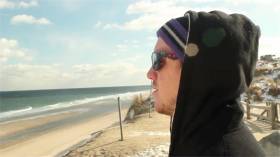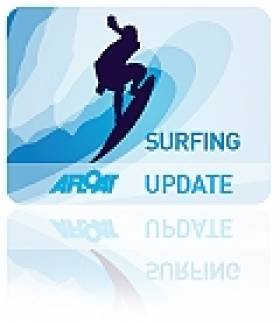Displaying items by tag: The Crest
World Premiere For Surfing Documentary In Dingle Next Weekend
#Surfing - A new documentary following two American descendants of the 'King of the Blaskets' as they surf the waves of their ancestral homeland will have its world premiere in Dingle next weekend.
The Crest will be screened as part of an eclectic programme at the Dingle International Film Festival at 6pm on Saturday 19 March at the Blasket Centre (Ionad an Bhlascaoid Mhóir), and again on Sunday 20 March at 2pm in the Phoenix Cinema.
Directed by Mark Covino, whose last film was the award-winning music documentary A Band Called Death, The Crest follows the exploits of cousins Andrew Jacob and Dennis 'DK' Kane as they trace their shared ancestry back to the Blasket Islands.
A rare stronghold of traditional Irish culture over the centuries, the rocky island chain is where their great great grandfather once presided as 'An Rí' - the king of the islands.
One of his responsibilities to the isolated community was to row the treacherous Atlantic seas to the mainland on the Dingle Peninsula for supplies.
His was a seaworthiness that seems to have carried on through the generations, as both Jacob and Kane are surfing enthusiasts to the professional level.
It's only natural, then, that they would explore their bloodline by putting themselves in their regal ancestor's shoes – or rather waters.
See the trailer for The Crest below:
Surfing Film Unites Descendants of Blaskets King
#Surfing - The Blasket Islands are the setting for a new documentary following the exploits of two surfers descended from the ancestral 'king' of the island chain.
IrishCentral reports on The Crest, the story of two distant cousins from opposite sides of the United States - Andrew Jacob from Massachusetts and Dennis Kane from California. Though previously unknown to each other, the two nevertheless share a deep passion for surfing.
And it's the waves that bring them together as they unite in the land of their great-great-grandfather to indulge their obsession and ride the giant swells for which the west of Ireland is becoming so renowned.
Indeed, Canada's National Post is just the latest to discover the attractions of surfing at Lahinch and the Cliffs of Moher
Crowdfunded via a Kickstarter campaign, the documentary crew already shot footage in Cape Cod and San Diego before decamping to the Blaskets off Kerry last month to shadow the cousins as they connect to their roots.
The film is directed by Mark Corvino, who co-directed the current film festival favourite music documentary A Band Called Death.






























































